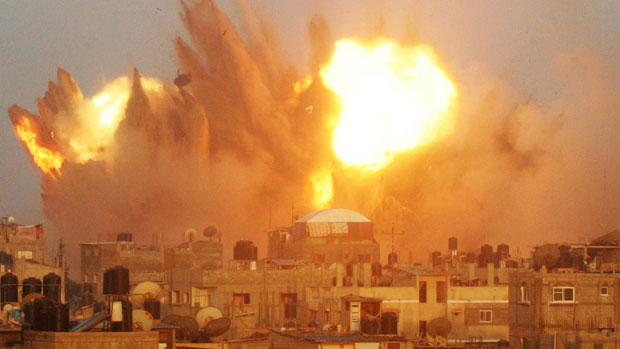‘Roof knocking’: how Israel warns of airstrikes
Controversial early-warning system deployed during strikes on Gaza

A free daily email with the biggest news stories of the day – and the best features from TheWeek.com
You are now subscribed
Your newsletter sign-up was successful
Benjamin Netanyahu has pledged to continue bombing Gaza following the death of a father and daughter caused by a rocket launched by Hamas into Israel.
“Since yesterday the army has carried out hundreds of attacks against Hamas and Islamic Jihad in Gaza,” the Israeli prime minister said in a video released by his office. “We will further intensify the power of our attacks”, he continued, adding that Hamas will be targeted “in ways it did not expect”.
Israeli bombing of the Palestinian-held territory has so far killed at least 40 Palestinians – placing the military’s controversial method for warning of impending strikes under the spotlight.
The Week
Escape your echo chamber. Get the facts behind the news, plus analysis from multiple perspectives.

Sign up for The Week's Free Newsletters
From our morning news briefing to a weekly Good News Newsletter, get the best of The Week delivered directly to your inbox.
From our morning news briefing to a weekly Good News Newsletter, get the best of The Week delivered directly to your inbox.
What is ‘roof knocking’?
Israel fires “warning rockets” – often sent from drones – to alert residents that a building is to be targeted. The Israel Defense Forces (IDF) call the technique “roof knocking”, The Washington Post says, and claim it is a “time-tested strategy”.
The warning rocket has no warhead, and is meant only to shake the building before armed missiles hit it three to 15 minutes later. The Israeli military has deployed the tactic during its bombing of Gaza in recent days, including its strike on a 13-storey residential building in Gaza City.
Palestinians living in the building “received several warnings, including phone calls and messages” informing them of the imminent strike, The Times of Israel reports, before “a preliminary roof-knocking strike” was delivered.
A free daily email with the biggest news stories of the day – and the best features from TheWeek.com
Gaza director of the United Nations Relief and Works Agency, Matthias Schmale, yesterday tweeted: “Residents of a building near my Gaza apartment have been warned it will be taken down and have evacuated. Over the last minutes a number of terrifying loud warning strikes and just now the big one taking it down.”
Israel said it was targeting the site as it housed “an office that is used by the political leadership” of Hamas, Reuters reports. It “was not immediately clear if the building had been fully evacuated, or if there were casualties”, eyewitnesses told the news agency.
Do warnings work?
Middle East and North Africa Research and Advocacy Director at Amnesty International Philip Luther has previously condemned the “roof-knocking” tactic as dangerous and ineffective.
“There is no way that firing a missile at a civilian home can constitute an effective ‘warning’.” Luther said in a 2014 statement. “Amnesty International has documented cases of civilians killed or injured by such missiles in previous Israeli military operations on the Gaza Strip.”
“Unless the Israeli authorities can provide specific information to show how a home is being used to make an effective contribution to military actions, deliberately attacking civilian homes constitutes a war crime and also amounts to collective punishment against the families,” he added.
Why warn before an attack?
Israel uses warning tactics to “avoid charges of indiscriminate killings or even of crimes against the rules of war”, The New York Times says. However, people often “die in any case, because they ignore or defy the warnings, or try to leave after it is too late”.
Bombs often “do not hit the building at which they are aimed”, the paper adds, leading groups such as Human Rights Watch to argue “that Israel’s efforts to warn civilians about impending attacks “do not absolve the armed forces”.
-
 How the FCC’s ‘equal time’ rule works
How the FCC’s ‘equal time’ rule worksIn the Spotlight The law is at the heart of the Colbert-CBS conflict
-
 What is the endgame in the DHS shutdown?
What is the endgame in the DHS shutdown?Today’s Big Question Democrats want to rein in ICE’s immigration crackdown
-
 ‘Poor time management isn’t just an inconvenience’
‘Poor time management isn’t just an inconvenience’Instant Opinion Opinion, comment and editorials of the day
-
 Epstein files topple law CEO, roil UK government
Epstein files topple law CEO, roil UK governmentSpeed Read Peter Mandelson, Britain’s former ambassador to the US, is caught up in the scandal
-
 Iran and US prepare to meet after skirmishes
Iran and US prepare to meet after skirmishesSpeed Read The incident comes amid heightened tensions in the Middle East
-
 Israel retrieves final hostage’s body from Gaza
Israel retrieves final hostage’s body from GazaSpeed Read The 24-year-old police officer was killed during the initial Hamas attack
-
 China’s Xi targets top general in growing purge
China’s Xi targets top general in growing purgeSpeed Read Zhang Youxia is being investigated over ‘grave violations’ of the law
-
 Panama and Canada are negotiating over a crucial copper mine
Panama and Canada are negotiating over a crucial copper mineIn the Spotlight Panama is set to make a final decision on the mine this summer
-
 Why Greenland’s natural resources are nearly impossible to mine
Why Greenland’s natural resources are nearly impossible to mineThe Explainer The country’s natural landscape makes the task extremely difficult
-
 Iran cuts internet as protests escalate
Iran cuts internet as protests escalateSpeed Reada Government buildings across the country have been set on fire
-
 US nabs ‘shadow’ tanker claimed by Russia
US nabs ‘shadow’ tanker claimed by RussiaSpeed Read The ship was one of two vessels seized by the US military